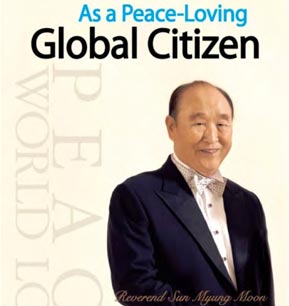ShareThis
Rev. Sun Myung Moon

As a Peace-loving Global Citizen is the autobiography of Rev. Sun Myung Moon, the founder of the Unification Movement. It was published in 2009 in both Korean and English by Gimm-Young Publishers of Seoul, South Korea. The book was released in South Korea on March 9, 2009 and debuted at #3 on the Businesss bestseller's list. It has ranked in various bestseller lists since then and was ranked 15th on the General bestseller's list as of October 14, 2009.
CHAPTER SEVEN - Future of Korea, Future of the World
More Than Giving Bread,
Teaching How to Make Bread
Teaching How to Make Bread
To solve the problem of hunger we must have a heart that is willing to plant seeds. Seeds are planted and wait unseen under the soil until they are able to germinate and break through their outer cover. Similarly, it is better to teach a person how to plant and harvest wheat and then turn it into bread than it is to give a piece of bread to a person who is about to die. The former may be more difficult and not result in as much public recognition, but it is the only way to arrive at a fundamental and sustainable solution to world hunger. We need to begin now to study the climate, the soil, and the character of the people in areas that suffer from hunger.
In Africa, there is a species of tree called manchuka. The people in Congo feed the leaves of this tree, which are high in nutrition, to their cattle to fatten them up before taking them to market. They also pound the leaves of this tree on a stone mill, add some oil, and fry them in batter. It may be a good idea to plant many manchuka trees and make powder out of the entire tree after throwing out the root, which is poisonous. The powder can be used to make bread. Also, Jerusalem artichokes, which resemble sweet potatoes, grow very quickly once they are planted in the soil. The amount that can be harvested is three times greater than that of other famine relief crops. Planting a lot of Jerusalem artichokes is another way to contribute to resolving the hunger problem.
In Jardim, a large earthworm is used in farming, and this makes the soil quite fertile. This earthworm exists only in Campana, but perhaps we can study its ecology and use it to help agriculture in other areas.
Koreans are working in the Mato Grosso region to study silkworms. If the cultivation of silkworms is successful there, it will be possible to make silk cheaply and sell it to buy food.
Koreans are working in the Mato Grosso region to study silkworms. If the cultivation of silkworms is successful there, it will be possible to make silk cheaply and sell it to buy food.
Wednesday, December 15, 2010
|
Labels:
More Than Giving Bread,
Teaching How to Make Bread part1
|
CONTENT
- FOREWORD
- CHAPTER ONE - Food is Love
- CHAPTER TWO - A River of Heart Flows with Tears
- CHAPTER THREE - The Man with the Fullest Stomach
- CHAPTER FOUR - Why We Work Globally
- CHAPTER FIVE - True Families Create True People
- CHAPTER SIX - Love Will Bring Unification
- CHAPTER SEVEN - Future of Korea, Future of the Wor...
- CHAPTER EIGHT - Message for Young People
